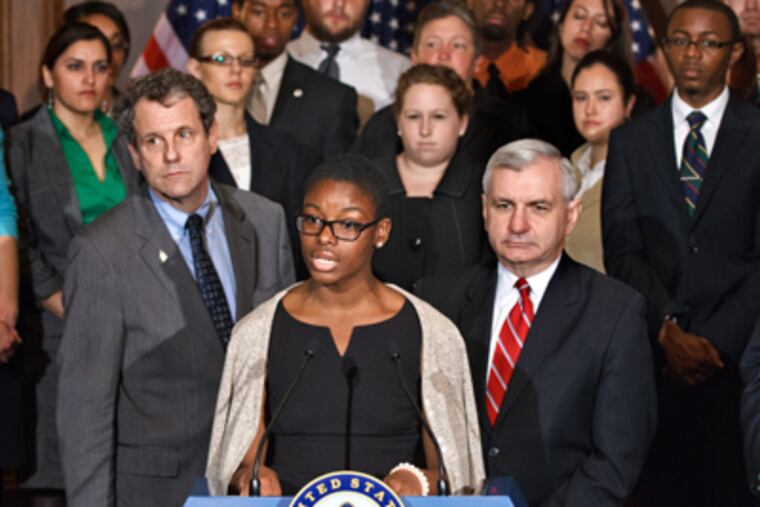Student-loan bill stalled in Senate
The measure would keep interest rates low. Republicans object to the means of funding.

WASHINGTON - Senate Republicans blocked a Democratic bill Tuesday to preserve low interest rates for millions of college students' loans, as the two parties engaged in election-year choreography aimed at showing each is the better protector of families in today's rugged economy.
The 52-45 vote to begin debating the legislation fell eight votes short of the 60 needed to proceed and stalled work on an effort both parties expect will ultimately produce a compromise, probably soon. For now, each side is happy to use the stalemate to snipe at the other with campaign-ready talking points while they are gridlocked over how to cover the $6 billion cost.
Senate Majority Leader Harry Reid (D., Nev.) said the vote showed that despite GOP claims that they support preventing an increase in student loan rates, "Republicans showed today that it's only talk."
He also noted that the likely GOP presidential nominee, Mitt Romney, supports a temporary extension of today's low rates and needled, "I suggest he pick up the phone and call Senator McConnell."
That was a reference to Senate Minority Leader Mitch McConnell (R., Ky.), who said the battle is a phony one manufactured by Democrats to woo votes from students. Both parties say they want to extend low interest rates.
"The Senate has ceased to be a place where problems are resolved. It's become instead a place where Democrats produce campaign material," McConnell said.
The vote was nearly party-line, with Reid voting "no" to give himself the procedural ability to demand another vote once a compromise is reached. Sen. Olympia Snowe (R., Maine), who is retiring after citing excessive partisanship in Washington, voted "present."
The Democratic bill would keep interest rates for subsidized Stafford loans at 3.4 percent for an additional year, rather than doubling automatically for new loans starting July 1. It would have no impact on current loans.
A 2007 law approved by a Democratic Congress gradually lowered the rates but pops them back up to 6.8 percent in July because lawmakers were worried about costs.
Stafford loans are for low- and middle-income students. The Education Department projects the measure would affect 7.4 million undergraduates borrowing money in the year starting July 1.
Republicans oppose the Democratic plan to pay for the bill by forcing high-earning stockholders in some privately owned corporations and professional practices to pay additional Social Security and Medicare payroll taxes. Even if it passed the Senate, it would have no chance of emerging from the Republican-controlled House.
Democrats reject the GOP version, which drums up money for the extension of low rates by abolishing a preventive health program created by Obama's 2010 health-care overhaul. Republicans are demanding a Senate vote on their measure but it cannot pass that chamber, and the White House has threatened to veto a House-passed bill that uses that same funding mechanism.
Both sides know they can push no student loan bill through Congress without a bipartisan consensus on paying for it.
But with politics the governing dynamic for now, it was no coincidence that each side proposed snatching savings from favorite targets that appeal to their parties' core voters: the rich for Democrats and Obama's health-care revamping for Republicans.